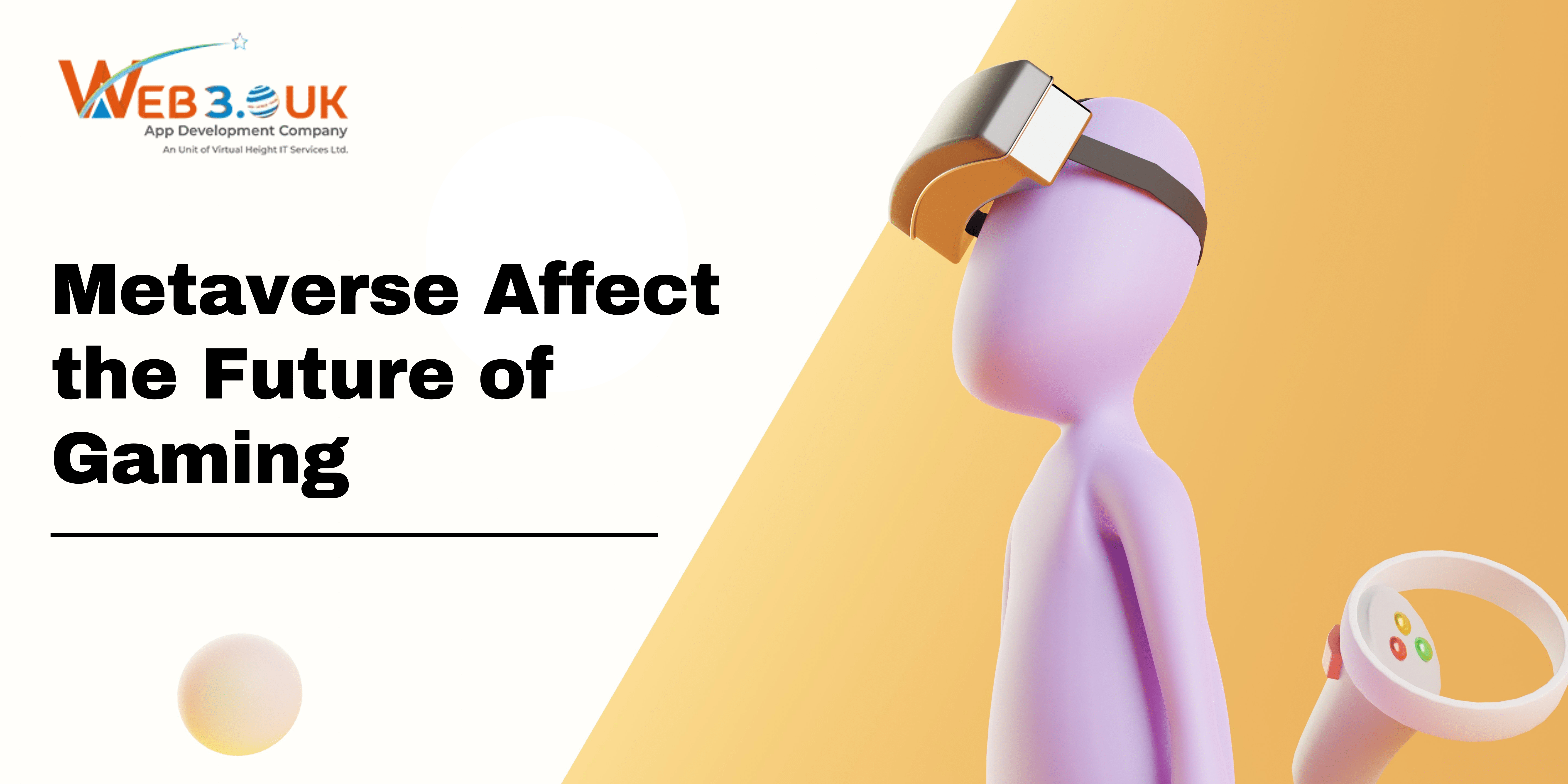In this ever-evolving landscape, the Metaverse is swiftly permeating diverse sectors. Its boundless dimensions are beckoning us, promising a new era that unfolds with each passing day. While the adoption of Metaverse technology has piqued interest across various fields, it is the gaming industry that is reigning supreme, capturing the collective imagination. The gaming industry has not only embraced the Metaverse early on but continues to captivate enthusiasts today also.
In this article, we will delve into the enthralling synergy between the Metaverse and the future of gaming, uncovering its transformative potential.
But first, let’s start with the basics: “What is Metaverse?”
Metaverse: Overview
A vibrant online community that unites individuals worldwide, fostering interactive connections and active engagement. In the modern landscape, businesses are propelling their ventures forward by harnessing groundbreaking technologies, including 3D reconstruction, AI, Blockchain, and beyond, to amplify the metaverse’s immense potential. Embracing these cutting-edge advancements, they empower the metaverse to transcend boundaries and achieve unparalleled prowess.
Within the metaverse, persistence reigns supreme, fueling its captivating essence for the masses. This entails the ability for the metaverse to remain accessible even after a player concludes a gaming session, ensuring a continuous and immersive experience. It mesmerizes gamers by offering a virtual realm that faithfully mirrors our tangible world. When traversing a metaverse platform, players are greeted with experiences akin to reality itself. They can engage in seamless communication with fellow players, partake in the exchange of virtual commodities, and even interact with virtual objects through the employment of haptic gloves and jackets. This harmonious blend of technology and imagination unlocks a realm where boundaries blur and possibilities expand exponentially.
Delving deeper into the gaming realm within the vast expanse of Metaverse Technology, it becomes imperative to unravel the essence of its core technology: augmented reality (AR). AR serves as the driving force behind the Metaverse, seamlessly merging the realms of user interaction and digital information. Picture augmented reality as the conduit through which users engage with a synchronized blend of real-time digital data.
Through the use of glasses or mobile devices, AR enriches the user experience by superimposing sensory information such as visuals, sounds, and more onto their surroundings. This amalgamation of physical and virtual realms alters the user’s perception of reality, creating a captivating and immersive encounter.
The Metaverse, with its exponential growth, brings forth a multitude of benefits. It promises to revolutionize gaming, facilitating enhanced gameplay experiences. Additionally, it simplifies the organization of meetings, events, and even studying, rendering these tasks more accessible and streamlined within its expansive virtual domain. As the Metaverse continues to evolve, it presents a gateway to a realm where the boundaries between the physical and digital worlds intertwine harmoniously, unlocking a tapestry of endless possibilities.
Are you aware of the Metaverse Use Cases, yet? If not, ➡CHECK IT RIGHT HERE!
Which Technologies Empower The Gaming Metaverse?
The ever-evolving metaverse has spurred video game developers to embrace cutting-edge technological innovations, leading to the adoption of game formats that align with this dynamic realm.
To craft a captivating gaming metaverse, developers harness the power of state-of-the-art technologies such as Blockchain and Artificial Intelligence. Here are several indispensable tools that must be readily available in order to bring the gaming metaverse to life:
➤ VR And AR Systems:
At the forefront of metaverse development are the groundbreaking technologies of augmented reality (AR) and virtual reality (VR). These transformative innovations offer users a complete immersion in a thrilling 3D environment, elevating the gaming experience to unprecedented levels.
Augmented reality (AR) employs visual elements and virtual characters to seamlessly blend the real world with a digital one, forging a captivating virtual experience. This versatile system is compatible with mobile phones and various digital devices, granting users the freedom to immerse themselves in this interactive realm from any location they desire.
➤ Cryptocurrency And Blockchain Technology
The advent of cryptocurrency and blockchain technology has revolutionized the construction of decentralized metaverses. These innovative tools enable a host of features, including the ability to digitally verify ownership, facilitate value transfers, collect digital assets, and ensure interoperability. Leveraging the foundation of real-world currencies, cryptocurrencies can be utilized for conducting business transactions within the immersive 3D realm of the metaverse.
➤ Internet-of-Things (IoT) Networking:
The integration of Internet of Things (IoT) networking empowers the metaverse to harness real-world information and utilize it effectively. By establishing connections with a multitude of physical devices, the IoT enables virtual entities to dynamically adapt their behavior based on environmental factors such as temperature and humidity. This seamless amalgamation bridges the gap between the metaverse and the tangible world, fostering a more immersive and responsive experience.
➤ 3d Model Reconstruction
While 3D technology has already gained significant traction, the COVID-19 pandemic has notably escalated the frequency of 3D reconstruction endeavors.
Numerous real estate agencies have embraced the innovative concept of virtual tours to provide prospective buyers with an immersive showcase of their properties. As a groundbreaking idea, the metaverse has leveraged 3D reconstruction techniques to amplify the capabilities of other established technologies, enhancing the overall experience for users.
Bottom Line
As the metaverse continues to evolve, numerous companies have already introduced cutting-edge gaming systems, signaling the early stages of this transformative realm. Pioneering initiatives like Decentraland and Sandbox are poised to emulate the trailblazing endeavors of prominent internet giants such as Microsoft and Facebook. With such forward-thinking efforts in motion, it is evident that a significantly enhanced metaverse awaits us in the foreseeable future.
FAQs (Frequently Asked Questions)
Q1. Will the metaverse replace traditional gaming platforms?
Ans 1. No, the metaverse is not meant to replace traditional gaming platforms. It aims to enhance and expand the gaming experience by connecting various platforms and providing a more immersive and interconnected virtual world.
Q2. Are there any concerns regarding privacy and security in the metaverse?
Ans 2. Privacy and security are crucial considerations in the development of the metaverse. As the technology progresses, measures need to be in place to protect user data and ensure a safe online environment. Blockchain technology can contribute to secure transactions and identity verification within the metaverse.
Q3. How will the metaverse impact game development?
Ans 3. The metaverse opens up new possibilities for game development. Developers can create interconnected experiences, allowing players to move seamlessly between different games and virtual worlds. The metaverse also encourages user-generated content, empowering players to become creators themselves.
Q4. Can the metaverse be accessed by anyone?
Ans 4. The goal of the metaverse is to be accessible to as many people as possible. However, access may still be limited by factors such as internet connectivity, hardware requirements, and affordability. Efforts are being made to address these barriers and make the metaverse more inclusive.
Q5. Will the metaverse have applications beyond gaming?
Ans 5. Yes, the metaverse has the potential to extend beyond gaming. It can be utilized in areas such as virtual conferences, education, training simulations, and social interactions. The metaverse offers a versatile platform for various industries to explore and innovate.










